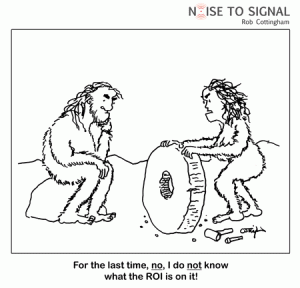
When I go into meetings there’s one question I love to ask when it comes down to social customer initiatives. I get the key stakeholders seated at a table together and ask, “If I told you that you would never know about making any direct revenue from your customers through social channels, would you still invest the time and money to do it?” Sounds like a odd question but more often than not, every single person in the room raises their hand and says, “yes, we would still make the investment.” When I ask them why, the response is usually “because that’s where our customers are.” We’ve seen some incredible stats about where customers spend their time online, how they research products online, how they share information and reviews online, and how they expect to interact with a brand online. These stats make it a difficult for companies to say, “nah, let’s skip the investment,” especially when their competition is already using social channels.
Now we get the ROI question which is, “what’s the ROI of engaging with customers online (or internally with employees through collaboration tools)”? Well, the only way to answer that question is through data, all sorts of data that can be matched and pieced together (not correlated but matched). This can include customer surveys, integrating social data with CRM systems, sophisticated tracking, and a host of other things. As you can imagine the cost of such initiatives isn’t very cheap, especially for an enterprise organization. So the question becomes, ‘at what point is it worth it to invest time and money to understand what the ROI of these initiatives and will the investment in understanding the ROI erode the actual ROI that we would have received to begin with’?
ROI makes sense for campaigns and projects, but if what we’re really talking about is an evolution of business, then does it make sense to measure the ROI for an evolution? If we all agree that “social,” both internally and externally, is going to be a new standard for how business is done, then isn’t the argument of ROI completely pointless? Again, I’m asking this just to challenge you and to get you to think differently. Am I saying that you shouldn’t understand the value or return of your investments? No. But, we must also understand that companies and individuals invest time and money into things all the time without being to show any type of financial return. When we as individuals spend time playing a musical instrument, go grocery shopping, give money to charity, buy a car, order a laptop, download an e-book, or purchase a new phone, we are investing time and money into these activities and behaviors without a way to show a financial return (most times). Let’s say we could for a moment figure out the ROI of one of these things, is it worth it? Take an individual purchasing a new phone and then scaling that purchase for a company with thousands of employees. To that company deploying a social customer initiative, it might be equivalent to an individual purchasing a phone – – it’s a necessary investment in an evolution of how business done. At what point does an investment warrant a ROI? How much do you need to spend before you have figure out what you’re getting in return: ten thousand dollars? A hundred thousand dollars? A million? One hundred million?
The truth is, we can use data to tell any story we want to tell by picking and choosing which numbers we want to use and how we use them. I can just as easily paint a positive picture with a set of data as I can a negative picture.
In the movie K-PAX starring Kevin Spacey and Jeff Bridges, there’s a scene where Kevin’s character (who claims to be from another planet) says to Jeff’s character (who thinks that Kevin is really Robert Porter, someone suffering from a mental disorder), “I will admit the possibility that I am Robert Porter, if you will admit the possibility that I am from K-PAX.”
I will challenge readers here to something similar, “I will admit the importance of measuring ROI if you will admit that sometimes it doesn’t make sense to invest the time and money into figuring out what the ROI is. The question is, when is that ‘sometimes’?”
I’ll leave you with a quote from Einstein:
“Not everything that can be counted counts, and not everything that counts can be counted.”
Comments